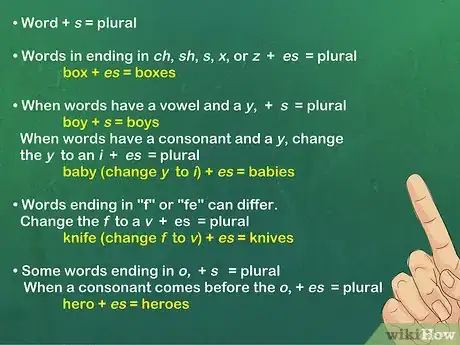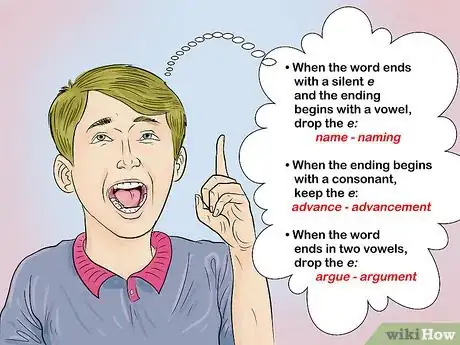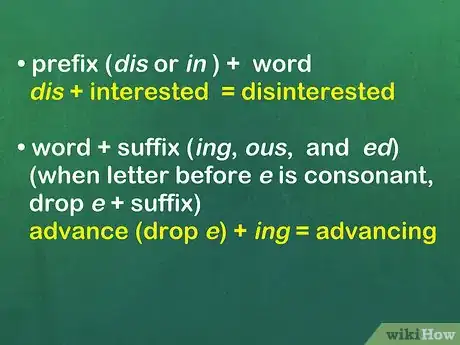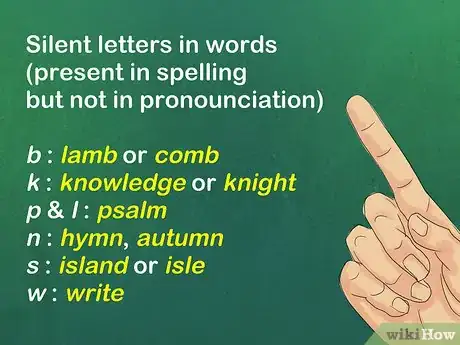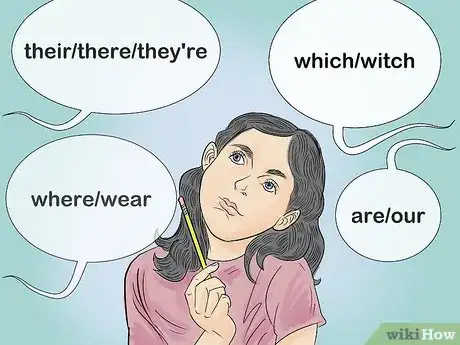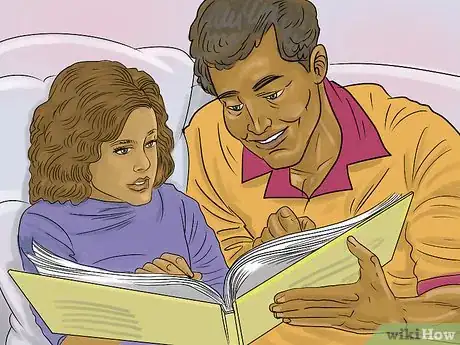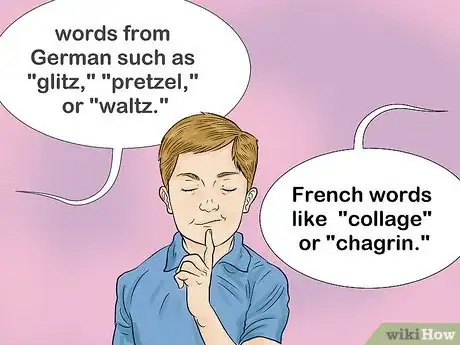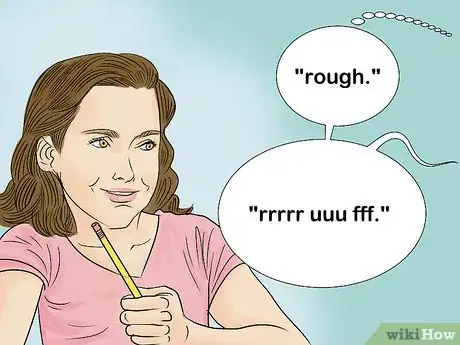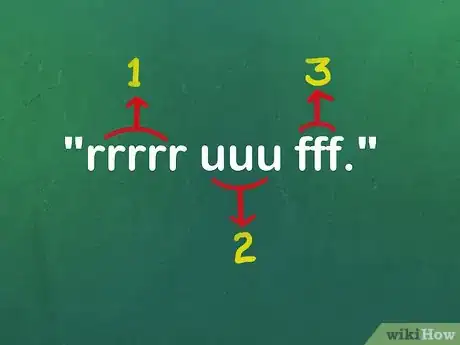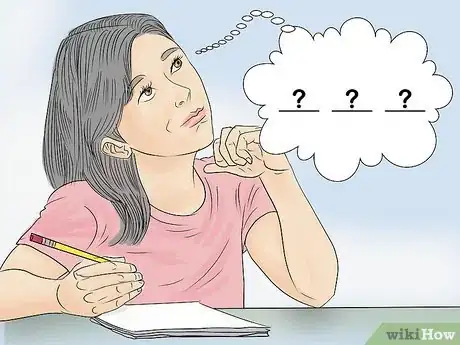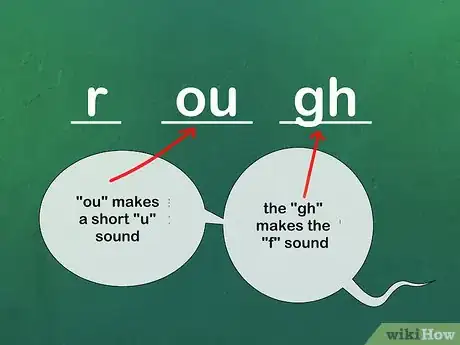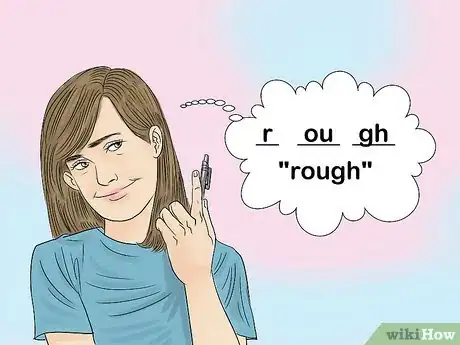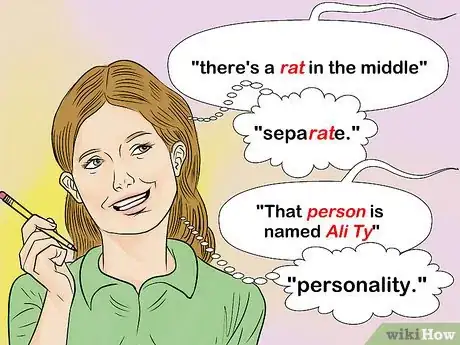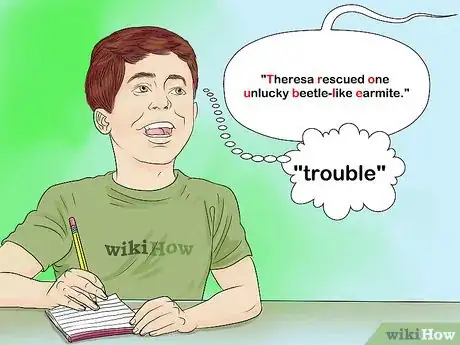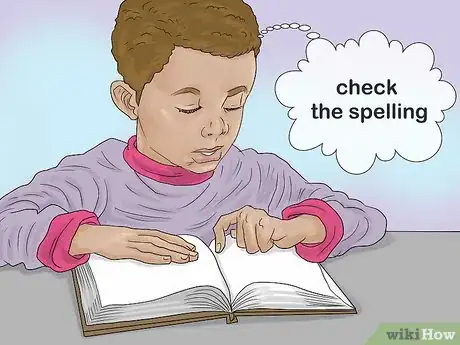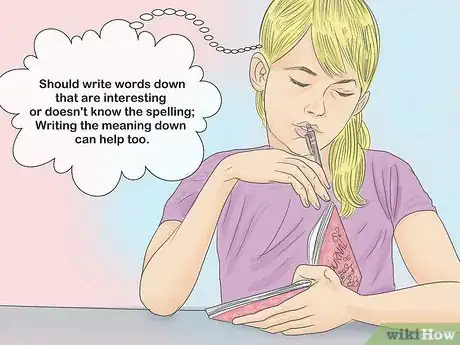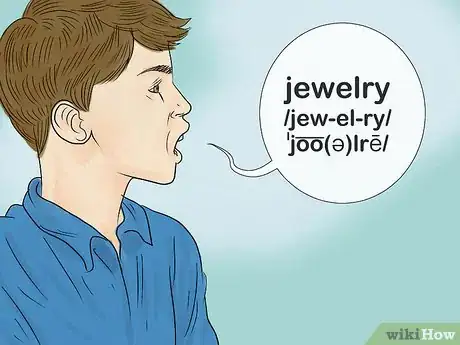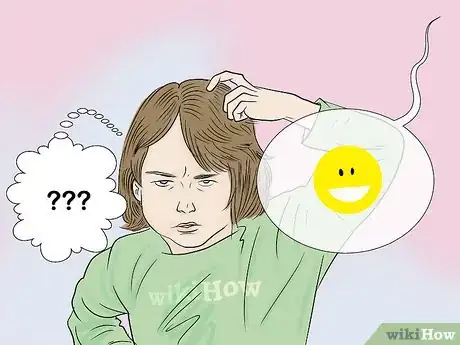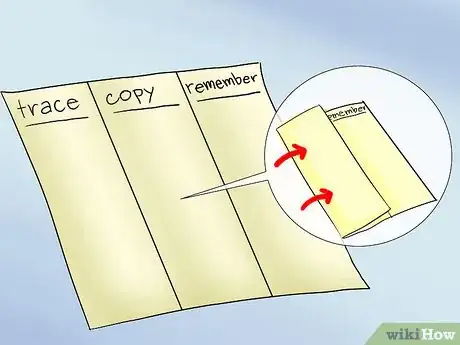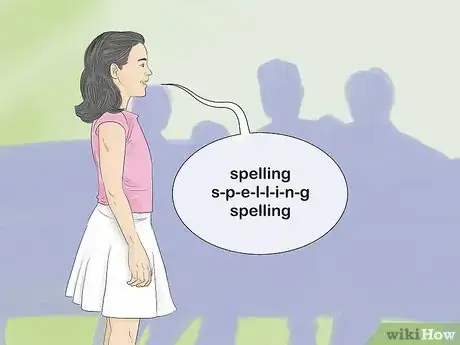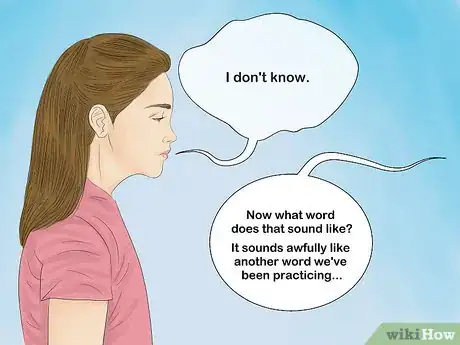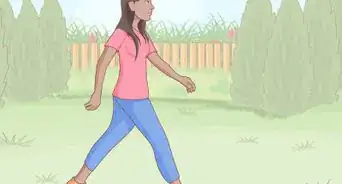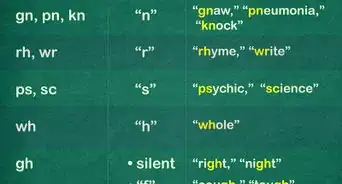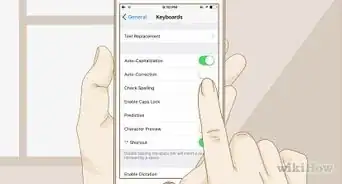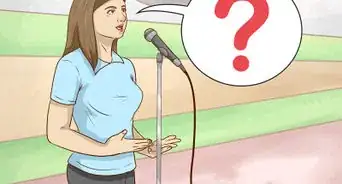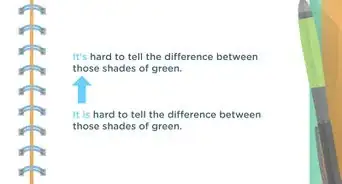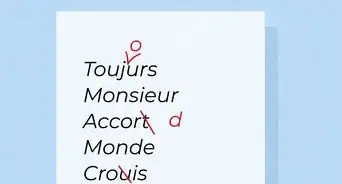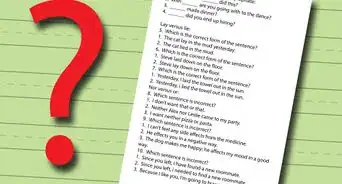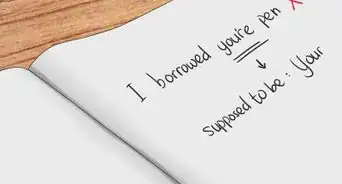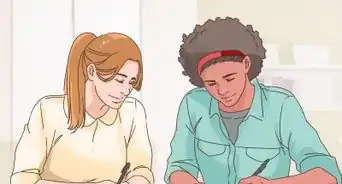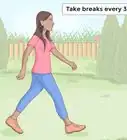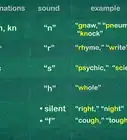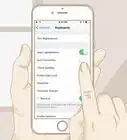This article was co-authored by Sylvia Rath. Sylvia Rath is a Parenting Specialist and the Director of Little Village Nursery School in Los Angeles, California. With over 30 years of experience, Sylvia guides parents through the preschool years and beyond by teaching respectful communication and positive discipline methods. Sylvia holds a BA in Psychology and Early Child Development from Antioch University. Before working at Little Village Nursery School, she taught preschool for eight years.
There are 16 references cited in this article, which can be found at the bottom of the page.
wikiHow marks an article as reader-approved once it receives enough positive feedback. This article has 12 testimonials from our readers, earning it our reader-approved status.
This article has been viewed 126,238 times.
If your child asks you to help him or her win a spelling bee, you may feel a bit overwhelmed. You can start by working on the basics of spelling, if your child hasn't already learned them. You can also work on word mapping and memory aids. Finally, you can help her learn her words for the bee.
Steps
Helping a Child Learn the Basics of Spelling
-
1Teach her how to make words plural. Breaking spelling down to the basics can help a child spell a word even if she's never heard it before. One of the basic rules you can teach her is how to make words plural.[1]
- Start with the most basic, adding "s." Explain that most words just take an "s" to make them plural.[2]
- Move to "es." Let her know that you add "es" with words in ending in ch, sh, s, x, or z most of the time, as in "box" to "boxes."[3]
- Explain the rules for words ending in "y." Much of the time, when you have a vowel and a "y," you simply add an "s," like with "boys." However, with a consonant and a "y," you usually add "ies," like with "babies."[4]
- Explain how words ending in "f" or "fe" can differ. Sometimes, words ending in "f" or "fe" change the "f" to a "v" and add "es," as in "knife" to "knives."[5]
- Watch for words ending in "o." Some words ending in "o" just take an "s," while sometimes when a consonant comes before the "o," it takes an "es" instead, as in "heroes."[6]
-
2Teach her when to drop the final "e." When adding an ending to a word that ends in "e," you employ different rules. The rules affect whether you keep the "e" or not, and having your child learn the rules can help her spell variations on rules.[7]
- When the word ends with a silent "e" and the ending begins with a vowel, you drop the "e," so "name" becomes "naming."[8]
- If your ending begins with a consonant, you keep the "e," such as how "advance" becomes "advancement." However, if the word ends in two vowels, you can drop the "e," such as when "argue" becomes "argument."
Advertisement -
3Look at other common prefixes and suffixes. Knowing how common prefixes and suffixes are spelled can help your kid sound out words. Start by getting a primer on the basic prefixes and suffixes, and use it to go over the basics with your child.[9]
- Prefixes, such as "dis" or "in," often do not change the spelling of the main word, making them easier to learn.[10] For instance, "interested" becomes "disinterested," without changing the main word.
- Suffixes, such as "ing," "ous," and "ed," often do change the spelling of the main word, so they can be a bit harder to learn. For instance, "advance" becomes "advancing," dropping the silent "e," as noted previously.
-
4Discuss silent letters. Silent letters can be killers for new (and even old) spellers. Talk with your child about the most common silent letters that she may encounter.[11]
- For instance, "b" is a common silent letter at the end of the word in words like "lamb" or "comb."
- "K" is often silent as well. Common examples include "knowledge" and "knight."
- "P" and "L" are both silent in "psalm," while "n" can't be heard in words like "hymn" or "autumn." "S" becomes silent in "island" or "isle," while "w" is silent in "write."
- Other letters that can become silent include "a," "c," "d," "t," and "u."[12]
- Go over common words with silent letters, especially ones on her list.
-
5Talk about homophones. Homophones are words that sound the same or similar but have different spellings and meanings. They can be very confusing to new spellers.[13]
- Discuss common homonyms such as where/wear, their/there/they're, which/witch, and are/our.
- While pronunciation can help in a few cases, work with your child to understand that the only way to tell some words apart is by asking for the definition.[14]
- Have your kid use memory tricks to help her tell common words apart. For instance, you could use "Witches like to scratch their itches with broomsticks." to help her tell it apart from "which."
-
6Focus on reading. Kids who read regularly pick up spelling more easily. The more often they are exposed to correct spelling, the more likely they are to pick up that word.
- Encourage your kid to read everyday. If she doesn't like to read by herself, sit down and read with her. She'll be more accepting if she gets to spend time with you.
- Make her sound out words as she goes, so she can start associating certain spellings with certain sounds.
-
7Work on etymology. Etymology refers to a word's history, including the root language it came from.[15] English has incorporated words from many other languages over the years. Latin and French, for instance, have both had a significant impact, and knowing when a word is derived from one of these languages can help give a clue about how to spell it.[16] German is also a heavy influence.[17]
- Explore words by language groupings. Many websites offer this service, and it can help your child learn how words from a particular language can have common spellings.[18]
- For instance, words from German are heavy on consonants, and they often have more internal and ending "z"s than other English words, such as "glitz," "pretzel," or "waltz."[19]
- French words, on the other hand, are often heavier on vowels, to the point that consonant sounds are sometimes softened, like with the "g" in "collage" or the "ch" in "chagrin."[20]
Learning Word Mapping
-
1Start by saying the word. Work together to figure out the sounds in a word. For instance, say the word is "rough." Extend the word out as you say it: "rrrrr uuu fff." Stutter consonants if you need to do so.[21]
- Word mapping is learning to associate pronunciation with letter groupings. It shows children that a word is a meaningful group of letters rather than just something to be memorized as a whole.[22]
-
2Count the sounds in the word. Once you've sounded out the word together, help her count how many sounds she hears. In the case of "rough," she likely can hear three sounds. If she's having trouble hearing them, sound out the word again, more slowly.[23]
-
3Place a blank for each sound. Now that you've counted each sound, you need to set up the word for spelling. Have her write a blank for each sound she hears.[24]
- For instance, with "rough," she'll have three blanks, one for the "r" sound, one for the "u" sound, and one for the "f" sound.
-
4Help her write down the correct spelling. For each sound, you're now going to write down the proper spelling of the sound in the blank. So in the first blank, you'd write "r," while in the second blank, you'd write "ou." In the final blank, you'd right "gh."[25]
- Talk about the hard parts of the word. For instance, "ou" makes a short "u" sound in "tough" (/u/).[26]
- Also, the "gh" makes the "f" sound at the end.
-
5Write the word as a whole. Once you've looked at the individual sounds, be sure to write the word as a whole. Have her write out "rough" below the three blanks.[27]
- It's also important to provide context for the word by giving its meaning.
- Practice with similar words. Give her words that are similar, like "tough," and have her try to do the steps on her own.
Teaching a Child Memory Aids
-
1Use tricks to help her remember specific words. Sometimes, a child can get hung up on certain words, never able to remember exactly how it goes. It can help to make up a silly little phrase or saying as a reminder. For instance, some people use "there's a rat in the middle" to help them remember how to spell "separate."[28]
- Anything that helps her reminder the word is fine--the sillier, the better.
- For instance, try something like "That person is named Ali Ty" for "personality."
-
2Make the letters in the word into a sentence. Another way to help a kid remember is to use the letters to make a sentence with each word in the sentence starting with one of the letters. This method is a common mnemonic or memory device. Once again, sillier phrases can help a child remember better.[29]
- For instance, to help her to remember to spell "dessert," try "Debbie eats strawberry shakes every Tuesday." The strawberry shake should also help trigger her memory.
- For "trouble," try "Theresa rescued one unlucky beetle-like earmite."
-
3Tell her to always check the spelling. Practicing the spelling of a word helps commit it to memory. However, if she's not sure how to spell it, it's important to look it up. That way, she's sure she's not practicing it the wrong way.[30]
- In addition, the process of looking it up can help commit to memory.
- Try using an actual paper dictionary for looking up words. Sometimes, the physical act of looking up a word can help solidify it.[31]
-
4Have her keep a journal. One way to learn more words is to keep a journal of interesting words you come across. Have your child create one. She should write words down that she comes across that are interesting or she doesn't (spelled correctly). If she doesn't know the spelling, have her look it up.
- Writing the meaning down can help her remember it, too.
-
5Encourage the child to look for similar sounds. Once she starts learning words, try to help her make connections between similar-sounding words. You can help her along by grouping similar words together, then try to help her find other words that fit the pattern.
- For instance, you might work with "television," "telephone," and "telekinesis." While the words all have different endings, they have the same basic pattern at the beginning.
Preparing for a School Spelling Bee
-
1Teach the child to listen carefully to pronunciation. Often, kids will get the pronunciation of a word wrong. In turn, they won't spell it correctly. At a spelling bee, though, the person calling the words will be careful to say the word perfectly. Teach your child to listen to the pronunciation and spell it in turn.[32]
- Try working with hard words with her that are often mispronounced. For instance, "jewelry" is often mispronounced as "jewelery" or "jewelry," which could lead to misspelling.
- Say the word clearly and have her repeat the pronunciation before trying to spell it.
-
2Use word spelling games. Online, you can find a wide variety of word spelling games. Some of them even let you input a set of words, so you can focus on the words your kid needs to learn. Others will let you set words by grade level.[33]
- Be sure to check out the website first to see if it's safe for kids.
- These games help her practice her words over and over, solidifying them in her memory, while keeping it fun at the same time.
-
3Identify words giving her issues. When preparing, try to note which words are giving her issues in particular. Once you note which ones are making her stumble, focus on those for some of the mnemonic devices listed in this article.[34]
- For instance, if she always messes up on "cleaver," try making up a silly phrase for it.
- Also, if your kid gets frustrated when she's having trouble spelling a word, the silly phrase can help diffuse the tension.
-
4Make a trace, copy, and remember guide. Divide a piece of paper into three columns. The first column is the "trace" column, where your child traces over the word. The second column is the "copy" column, where she writes the word herself but is able to look at the first column. The third column is the "remember" column. Once she's done the first two, she folds the paper over on itself so the first column is covering the second column. Then she tries to write the word from memory. You can also fold back the "remember" column and flip the paper over to that side.[35]
- In the "trace" column, fill in a list of words she needs to learn for the spelling bee, writing carefully.
- While she's tracing the letters, have her practice spelling it as she would at the the spelling bee. For instance, if the word is "simple," have her say "simple," then name the letters as she's tracing them, then say "simple" again. Have her do it again each time she writes it.[36]
-
5Have her practice. Even if your child knows all the words, it won't do her any good if she gets up in front of the room and freezes. She needs to practice her words, spelling-bee style.
- Use her list of words that she needs to spell. Make sure to have definitions ready if she asks.
- Gather the family or a few friends. Have her stand up in front of you. Give her a word to spell. You can even make it a family event by having a family spelling bee.
- Make sure she uses the correct format of stating the word first, spelling it, and then stating it again.
-
6Throw in a few words she doesn't know. When it comes to practice, try giving her a few words that she hasn't practiced but may be able to spell because of their similarity to words she knows. She's likely to come across a word she doesn't know in the spelling bee, and she needs to learn how to work it out.
- If she says, "I don't know," encourage her to sound it out. If she gets it wrong, tell her it was a good try, and give her the correct spelling. Help her see how it connects to other words she knows.
- Praise her for trying to work it out, whether she gets it wrong or right.
- If she freezes, try to talk her through it. Say things like, "Now what word does that sound like?" For instance, if the word is "night," another hint could be, "It sounds awfully like another word we've been practicing that begins with an 'r.'"
Community Q&A
-
QuestionHow can I calm the butterflies in my stomach?
 Community AnswerRemember that you've already gotten this far, and if you don't win, you'll most likely be able to participate the next year. All of the other kids are probably just as nervous, especially if they're a first timer. Just don't stress too much about it!
Community AnswerRemember that you've already gotten this far, and if you don't win, you'll most likely be able to participate the next year. All of the other kids are probably just as nervous, especially if they're a first timer. Just don't stress too much about it! -
QuestionWhat should I say to my child if she loses?
 Community AnswerYou could first show that you acknowledged her effort for the event and her willingness to participate in the event. Then you could encourage her to practice for another opportunity like this one.
Community AnswerYou could first show that you acknowledged her effort for the event and her willingness to participate in the event. Then you could encourage her to practice for another opportunity like this one. -
QuestionWhat if I mess up in front of all those people?
 Community AnswerDon't be embarrassed -- you won't be the first or last spelling bee contestant to have that experience. You can't succeed if you don't take the risk to try. Be brave -- you can do it!
Community AnswerDon't be embarrassed -- you won't be the first or last spelling bee contestant to have that experience. You can't succeed if you don't take the risk to try. Be brave -- you can do it!
References
- ↑ http://www.factmonster.com/ipka/A0886509.html
- ↑ http://www.factmonster.com/ipka/A0886509.html
- ↑ http://www.factmonster.com/ipka/A0886509.html
- ↑ http://www.factmonster.com/ipka/A0886509.html
- ↑ http://www.factmonster.com/ipka/A0886509.html
- ↑ http://www.factmonster.com/ipka/A0886509.html
- ↑ http://grammar.ccc.commnet.edu/grammar/spelling.htm
- ↑ http://grammar.ccc.commnet.edu/grammar/spelling.htm
- ↑ http://www.learnenglish.de/spelling/spellingtext.html
- ↑ http://grammar.ccc.commnet.edu/grammar/spelling.htm
- ↑ http://www.learnenglish.de/spelling/spellingtext.html
- ↑ http://www.learnenglish.de/spelling/spellingtext.html
- ↑ http://grammar.ccc.commnet.edu/grammar/spelling.htm
- ↑ http://grammar.ccc.commnet.edu/grammar/spelling.htm
- ↑ http://www.oxforddictionaries.com/us/definition/american_english/etymology
- ↑ http://www.merriam-webster.com/help/faq-history
- ↑ http://myspellit.com/lang_french.html
- ↑ http://myspellit.com/lang_french.html
- ↑ http://myspellit.com/lang_german.html
- ↑ http://myspellit.com/lang_french.html
- ↑ http://www.readingrockets.org/article/how-study-spelling-words-spelling-strategy-students
- ↑ http://www.auburn.edu/~murraba/spelling.html
- ↑ http://www.readingrockets.org/article/how-study-spelling-words-spelling-strategy-students
- ↑ http://www.readingrockets.org/article/how-study-spelling-words-spelling-strategy-students
- ↑ http://www.auburn.edu/~murraba/spelling.html
- ↑ http://www.spellzone.com/word_lists/list.cfm?wordlist=180
- ↑ http://www.auburn.edu/~murraba/spelling.html
- ↑ http://www.infoplease.com/ipa/A0903395.html
- ↑ http://www.infoplease.com/ipa/A0903395.html
- ↑ http://www.ldonline.org/article/6192/
- ↑ http://www.learnenglish.de/spelling/spellingtext.html
- ↑ http://www.infoplease.com/ipa/A0903395.html
- ↑ http://www.kidsspell.com/
- ↑ http://www.infoplease.com/ipa/A0903395.html
- ↑ http://www.ldonline.org/article/6192/
- ↑ http://www.ldonline.org/article/6192/
About This Article
To get your child ready for their spelling bee, make learning fun with games and books and teach them some common pitfalls they should avoid. Encourage your child to read something they enjoy every day, like a book, magazine, or website, so they’re constantly exposed to new words. There are also a variety of spelling games online, which make learning new words fun and engaging. If your child’s reluctant to attempt more difficult words, encourage them to give it a go. If they get it wrong, tell them it was a good try, and tell them the correct spelling. Explain homophones to your child if they don’t understand, so they don’t get caught off guard by them in their spelling bee. You can also show them common words with silent letters, like, “Knowledge,” “Island,” and “Autumn.” For more tips, including how to teach your child to word map difficult spellings, read on!
